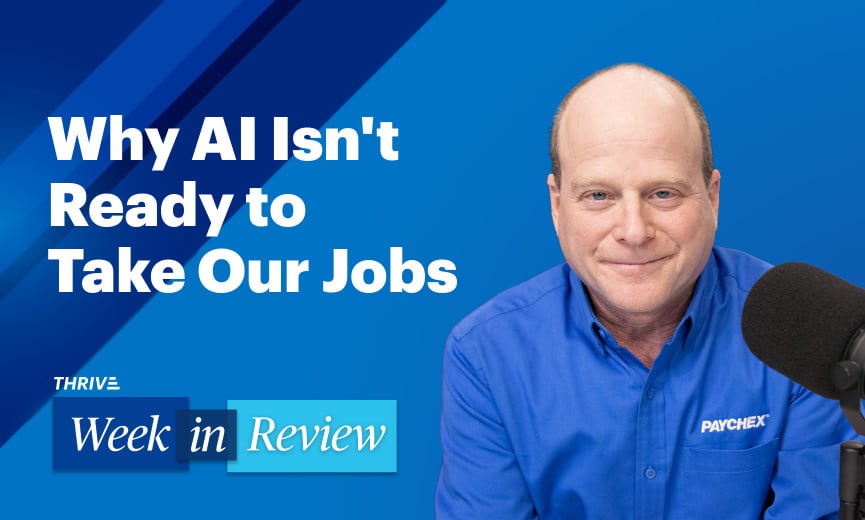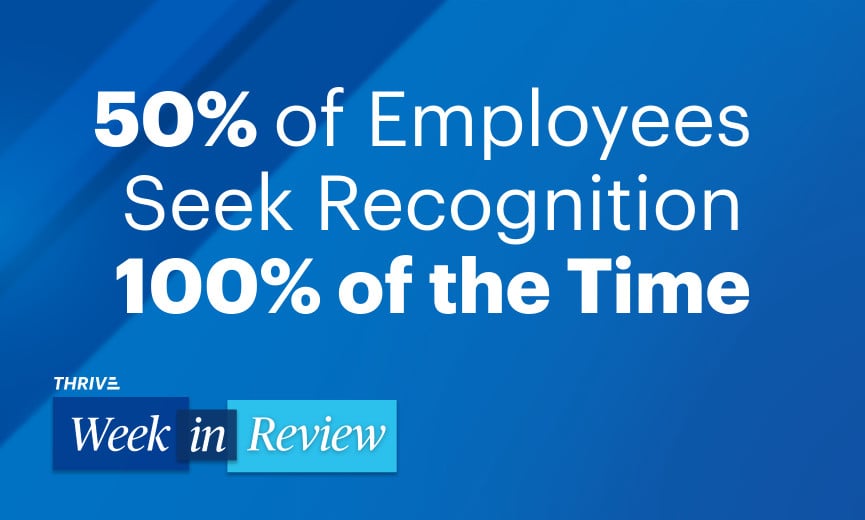- Thrive
-
Season
5Episode48
SMB Sales Uptick, Employers Sued, RTO Mandates, Job Searches Drop
Podcast •
Watch
Summary
Small businesses are enjoying solid year-over-year rise in sales but driving that increase is higher prices. Gene Marks points out that discretionary spending is growing slower than essential spending. Employers facing lawsuits from employees can prevent them by addressing a few areas, including workplace environment. Speaking of workplace environments, it will be interesting to see how return-to-office mandates from two corporate giants plays out. A recent survey found that 73% of employers were staying put in their roles, helping turnover issues but impacting talent acquisition.
View Transcript
Hey everybody, this is Gene Marks and welcome to this week's episode of the Paychex THRIVE Week in Review. This is where we take a few items in the news that impacts your business and mine, and we talk about them a little bit.
So, economic news: A new survey came out from a company called Fiserv. They are a global provider of payments and financial services technologies. They emphasize they focus on the retail sector. Fiserv surveys every month – they do an index every month – of over 2 million businesses that are part of their network, and they actually reported good news.
Fiserv said that small business sales, these are generally retailers and restaurants, ticked up in July driven by higher average sizes of the of sales. Year-over-year sales are up 3.6 percent and transactions are up 3% – saying that activity remained strong – signaling the continued resilience of consumer spending.
Average ticket sizes, that's like the size of like the transaction, basically, you know, one in store purchase or restaurant purchase; that grew about 0.7%. According to the chief data officer at Fiserv, he said “July brought modest monthly sales growth for small businesses, but those gains were largely driven by higher average tickets, likely resulting from continued inflationary pressure. Economic pressures continue shifting spending patterns, as well. Consumers are spending more on essentials while discretionary is growing at a much slower pace."
So, bottom line is that sales are still holding up there. They're still modestly strong as it is, and consumer resilience is obviously still taking place because consumers are still spending money. This is as of July from Fiserv.
Let's talk about some HR stuff this week, as well. There was a really great article that came out in HR Dive. It was written by Emilie Shumway, and it listed out the top 10 reasons employers get sued and how to prevent them. This is an article on HRDive.com. I found it interesting. I won't go through all the top 10 reasons but let me at least tell you what the top three are.
Number three reason why employers get sued is misclassification of employees between those that should be getting overtime pay or not getting overtime pay. Some that would be independent contractors or not. It could lead to wage theft if it's not classified correctly, and employers are getting sued for that reason.
Number two, negative leave alternatives. In other words, employer employees with a certain health condition aren't allowed to take time off of work or they're denied that time off by employers. That is the second most reason why employers are getting sued.
And number one is an overall unhealthy work environment. Bullying, unlawful behavior, unprotected behavior, conduct that leads to harassment and discrimination – that also leads to lawsuits by employees.
So, an unhealthy wealth environment is number one. Number two is neglecting certain leave when people need it. And number three is misclassifying workers. Those are three of the top ten reasons why employers get sued. Great article on HRDive.com.
Also, in the news this week is return to office. There is news out of Redmond, Washington, where Microsoft is doubling-down or they are considering a stricter return-to-office policy. This is being reported by Business Insider. The new policy could kick in at Microsoft's headquarters as soon as January. They want to require their people in Redmond, where their headquarters is, to be required to be in the office three days a week.
And not to be outdone, AT&T's CEO John Stankey has issued a return to office ultimatum to employees this week. The company began calling employees back to the office full time earlier this year, ending its previous hybrid model.
The change has proven unpopular some workers who cited logistical problems like desk shortages and parking issues. But now Stankey has doubled down on the company's position in a new memo emphasizing the role in-office work plays in enabling large-scale enterprises. I think it also enables small-scale enterprises too.
Here's what he said. Stanky said, “If a self-directed, virtual, or hybrid work schedule is essential for you to manage your career aspirations and life challenges, you will have a difficult time aligning your priorities with those of the company and the culture we aim to establish.”
So, AT&T and Microsoft – two large companies – are getting stricter about requiring their employees to return to office this year.
It's a whole bunch of considerations as to whether or not you want to consider such a policy. And honestly, if you want to – my advice, when I look at my clients, for most small businesses, depending on the worker, a hybrid where you can allow an employee to work from home maybe a day a week, particularly for employees that can do that, that are in the office, that seems to be like, you know, the best solution for most of my clients.
And still requiring employees to be in the office three, four days a week is something that's very important to build a team.
There are other people that might not be able to work from home, and I have a lot of clients that are considering four-day work weeks or extended or, you know, different types of flexible scheduling to allow them that flexibility and time off, as well.
Flexibility is key. So, I'm not saying you should require all of your employees to come back to the office five days a week – and frankly, neither is AT&T and Microsoft. But they are requiring their employees to come back to the office a lot more than they were in the past.
Finally, there is a new survey of U.S. professionals by business consulting firm Robert Half. This is reporting on bizjournals.com. They found that 73% of those respondents said they plan to stay in their current role – 73%. For the 27% who said they plan to proactively look for a new job – that's, first of all, down from 29% from back in January, and it's also down from 35% of people that were looking to look for jobs back in 2024.
So, more workers are looking to stay at their jobs, less workers are saying that they want to find new jobs. And by the way, Gen Z workers are the most likely to say they were searching for a new job at about 32%, followed by Millennials, with workers in marketing and creative and technology fields being the most likely to want to look for a new job.
The operational president of Robert Half said in this statement. “In today's market, workers are carefully evaluating their current role and what matters most in their career. With fewer professionals actively seeking new opportunities, employers need to be more strategic in how they attract top talent for critical roles. This includes a focus on flexibility, career pathing and maintaining a positive workplace culture.”
A lot of this leads into why we're seeing numbers falling for open jobs in this country, as well. So, on the one hand you have less employees that are looking for work, so that's pretty good for us retaining our top talent. On the other hand, if you have less employees looking for work that provides or certain types of changes, challenges if we're looking for new talent.
So, it's never perfect. That's what it's like running a business. There's always a, you know, two sides to every story.
That's the news for this week. You have been watching the Week in Review, a Paychex THRIVE Podcast. My name is Gene Marks. If you need any help or advice or tips in running your business, please join us and sign up for our Paychex THRIVE newsletter. Go to paychex.com/thrive.
Hope you've gotten good information from here. We will be back to you next week with more news that impacts your business. See you then.
Do you have a topic or a guest that you would like to hear on THRIVE? Please let us know. Visit payx.me/thrivetopics and send us your ideas or matters of interest. Also, if your business is looking to simplify your HR payroll benefits or insurance services, see how Paychex can help. Visit the resource hub at paychex.com/worx. That's W-O-R-X. Paychex can help manage those complexities while you focus on all the ways you want your business to thrive.
I'm your host, Gene Marks, and thanks for joining us.
This podcast is property of Paychex, Incorporated 2025. All rights reserved.

 Apple Podcast
Apple Podcast Spotify
Spotify iHeartRadio
iHeartRadio









